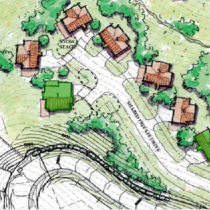Landscape Architecture for Landscape Architects › Forums › PROFESSIONAL PRACTICE › Creating better connections – entry level to ASLA
- This topic has 1 reply, 14 voices, and was last updated 14 years, 1 month ago by
 Amber Varie Raynsford.
Amber Varie Raynsford.
-
AuthorPosts
-
November 11, 2011 at 7:39 pm #159374
John Hager
ParticipantI am a member of ASLAs Emerging Professionals Committee. What are some needs of entry level landscape architects that will create a better connection to ASLA? How can ASLA assist entry level LAs?
December 16, 2011 at 1:37 am #159409 Amber Varie RaynsfordParticipant
Amber Varie RaynsfordParticipantI believe that many entry-level LAs would benefit from a licensure mentoring program. It is hard to justify the cost and usefulness of credentials when you’re just starting your career; especially when many firm’s are hesitant to pay these costs for entry-level employees considering the current economic climate. A licensure scholarship or loan program would be amazing as well.
December 16, 2011 at 2:26 am #159408Tanya Olson
ParticipantGreat points! How about a CAREER mentoring program? Most LAs end up owning their own firm eventually – how do they get to that point? How do they become principals in firms they are committed to? How do they move from college to licensure to professional? I know that we expect the firms to automatically provide this mentoring – some do some don’t.
John – I appreciate that ASLA is starting to ASK!
December 16, 2011 at 2:58 am #159407 earthworkerParticipant
earthworkerParticipantHow can ASLA become relevant in the industry again? That should be the real question. ASLA is an organization that is completely disconnected from the reality of the industry they supposedly represent. It’s an organization that continues to ignore the plight of those who LA’s who have lost their jobs. It’s an organization that…sells…..their title of full member ASLA regardless of the members’ qualifications. (Unlike AIA) It’s an organization that, in the face of the second Great Depression, refused to lower membership fees or accommodate those former members who could no longer afford membership. ASLA is irrelevant. It exists only to promote themselves and print a picture book magazine. Save your money for the LARE exam and eventual licensure.
December 16, 2011 at 4:35 am #159406 BoilerplaterParticipant
BoilerplaterParticipantStart by developing a business model that isn’t so fragile, so susceptible to economic downturns. We shouldn’t be so dependent on new construction when that is so cyclic. There needs to be more attention paid to how to actually make a living at this. Many in my class could not find jobs in the field and so went into other fields or went back to school. There has been no “entry level” for many graduates.
December 16, 2011 at 5:33 am #159405 ncaParticipant
ncaParticipantthat would be awesome if any of my employers paid for my exams and study materials. what a thought.
December 16, 2011 at 4:52 pm #159404John Hager
ParticipantGlad to hear the passion about the subject matter. It will be good to see if this has “legs.” I can relate to the concerns of cost. Even beyond costs, a mentor would be able to answer questions about what licensure really means and other complexities associated with it. I will say that your local state office should be able to answer certain questions. As far as costs, if your office expects you to be licensed, they should pay for it and you should not feel hesitant to ask for it to be paid.
As far as how LAs get to an ownership position. I for one have fallen into it due to a layoff and the difficulty of finding another job.
December 16, 2011 at 4:57 pm #159403John Hager
ParticipantI have heard the relevancy issue raised before and I have raised that issue in the context of current discussions regarding RLA versus PLA as a prof. designation after your name. The designation is a mute point if you constantly have to struggle to explain to people what you do for a living.
December 17, 2011 at 4:16 am #159402 mauiBobParticipant
mauiBobParticipantEarthworker!! (LOL). You said it all, my friend. My employer pays licensure fees, but I’m not part of ASLA. Never EVER will become a member of such an irrelevant professional group. My negative feelings towards ASLA go way way way back! It started as a 3rd year student. I’d rather be part of Urban Land Institute.
Why there are people (students) who are trying to become future landscape architects completely baffles me! Are they paying attention to current real world news or dreaming in wonderland in a safe haven called a University? But, that’s a different topic for another day!..
December 17, 2011 at 1:41 pm #159401 Andrew Garulay, RLAParticipant
Andrew Garulay, RLAParticipantAll of this, the negativity toward ASLA, the disappointment of not getting internships, and how LAs are getting beat down by the economy is all related to the same thing. That is that ASLA and CLARB have created an image of what landscape architecture is that is based on appealing to recruiting rather than developing people to fill needs in the market place.
Look at any university’s web page or look at ASLA and, if you knew nothing else of this profession, you would determine that it is all about being empowered to implement environmentalism, social engineering, and reshaping projects to follow those agendas and not the agendas of whomever is developing the land. There is also a stigma attached to residential and non-cutting edge commercial design which just happens to be where the majority of work in terms of numbers of people working in this profession are. All we see is green roofs, living walls, and urban planning that is supposed to transform all of the ills of societal problems and turn crack dealers into preachers.
Get back to our roots. It is design on the land! All projects from chemical warehouses to environmental restoration. We work FOR developers for the most part …. those of us who do work. We work as advocates for their projects – through design and often in front of regulatory bodies. If we are brain washed to work against or to hold values against those that would pay for our skill set, we won’t be working (can we have a show of hands?).
If you enter this profession to stop development, what projects do you think you will be hired to design?
When you paint the image that LAs are all about cutting edge environmental issues you not only attract people against the industry (land development) that supports it, but that message goes to the land developers who don’t want to hire people who have a different agenda than they do.
Engineers get “our work” because they are professionals who take on the roles that they are hired to do. They don’t claim a philosophy and therefore are not labelled. Their image is of getting the work done. Ours is always about idealic philosophies. When the job is making a project happen, it is all about getting things done. Why don’t we adopt that attitude in education and in our professional advocacy organization?
We went for more and got less!
December 17, 2011 at 6:35 pm #159400John Hager
ParticipantAndrew
I see some valid points here. As I attend various speeches on professional topics, I often find myself searching for nuggets that I can actually use profesionally. While it is challenging sometimes to find real world nuggets of information, I have found that the search is part of the deal.
In regards to University web pages in paragraph 2, I know that universities feel they need to prepare students for both the professional world as well as a potential academic track and consequently don’t focus as much on a client satisfaction.
In response to what you say in paragraph 3, hopefully you are not selling out to others. I have found that I can be a shrewd champion for what is important, I.e. stormwater recharge, green roofs and other items when on a design team. The trick is to know how to be real world enough (and not sound flakey) to sell these ideas. I don’t call myself a tree hugger and am realistic but at times, if you don’t speak up for the trees, no one else will. Sometimes the easy way out is an engineered solution and the individuals who have gained the most trust are engineers. You really can make a difference while appealing to the client and to the masses. You just need to arm yourself with research to know how to pose greener solutions in a practical fashion.
December 18, 2011 at 3:34 am #159399 Andrew Garulay, RLAParticipant
Andrew Garulay, RLAParticipantParagraph 3:
There is a difference between selling out and being advocates for the people we work for. Every time I bring this up,the same thing usually happens. People who don’t want to hear it set up an image that you either stick with the extreme image or you are a sell out. We all do the best we can to implement good environmental practices. That is not what I am talking about.
You are right on my point when from where you mention being “real world enough” to sell those ideas and right through that to the end of your post. That is exactly right. The problem is that there seems to be a lot of things written and a general image growing that is getting our profession labelled as being more interested in the green agenda than helping our clients. I have been in meetings while being on a civil engineering team without some of the others knowing that I am an LA where it was suggested by someone, an attorney in one case, that bringing in an LA might be a good thing. Two separate times the developers had the same negative reaction saying that LAs work against the project. One went so far as to say that
‘they always try to turn it into a bunny park”.
Regardless of whether their concerns are valid or not, the fact that some avoid us because they perceive us to be a problem due to that image which ASLA and the universities have worked so hard to create. This has to be recognized and something has to be done to stop the self destruction.
Our image should be about being effective designers on the land as masters of all criteria to achieve successful projects. It should go without saying that being good stewards and implementing the best practices are part of that, but we hijacked the Greeny Bus and tried to become the flagship of the environmental movement. Hundreds of people who have seemingly no interest in development have been attracted to the profession. Now the green bus is hijacking us to some extent because many are avoiding us because they think we’ll degrade the goals of their projects and add unnecessary expense to them.
We need to be seen as a solution for the people developing land, not just a PR campaign for the general public and future students. It is about jobs and a thriving profession!
It is also going to ultimately fail as a recruiting strategy because all of the folks that came into this to be eco-warriors are finding that there are less jobs for them than anyone else. There are a lot of bitter recent grads out there.
December 18, 2011 at 3:45 am #159398John Hager
ParticipantSo in your last sentences, is this a sentiment echoed by other grads that you have talked to?
December 18, 2011 at 3:50 am #159397 Andrew Garulay, RLAParticipant
Andrew Garulay, RLAParticipantRead the posts on this forum. It is pretty clear. It has been quieter lately, but if you look for the threads with the highest numbers of posts, I think you might find some of that bitterness there.
December 19, 2011 at 8:41 am #159396 Jason T. RadiceParticipant
Jason T. RadiceParticipantThat, and the site redesign…
-
AuthorPosts
- You must be logged in to reply to this topic.


